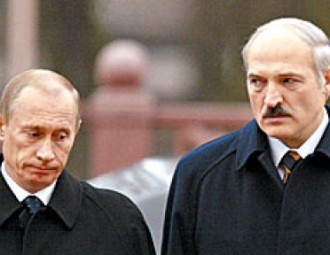Before EEU comes into force, tensions in Belarus-Russia economic ties rise

Despite Kremlin's attempts to build up pressure on Minsk, there is no common position among the Russian authorities on how to resolve the ‘food war’ between Belarus and Russia.
At the same time, the Kremlin is trying to lower Minsk’s status in integration projects with former Soviet countries by starting the process of shutting down the Belarusian-Russian “Union State”.
Regarding the meeting on economic development, president Lukashenka stated that Belarus was not responsible for the limitation of food exports to Russia.
As expected, with the agreement on the Eurasian Economic Union that comes into effect on January 1, 2015, and the worsening economic situation in Russia, both Russia and Belarus are increasingly worried about protecting their economic interests. .
Russian politically biased media try to present the attempts of Minsk to protect their interests in the ‘food war’ as a kind of ‘information war’ against Moscow as well as an aspiration of pressuring the Kremlin by threatening to break up the Eurasian integration process. At the same time there is no common position among the Russian authorities on how to resolve the ‘food war’ between Belarus and Russia.
For instance, IA Regnum, a website close to the Kremlin, accuse the Belarusian authorities of initiating “another ‘information war’ with Russia, trying to show the ‘trade war’ as an attempt by Russia to limit the volume of exports of ‘inexpensive and high-quality’ Belarus-made food to Russia, but not as an aspiration of Federal Service for Veterinary and Phytosanitary Surveillance to limit the illegal traffic of dangerous food.”
Russian analysts are attempting to accuse Minsk of trying to break up one of the most important achievements of Belarusian-Russian integration – the absence of border and customs control between the two countries. After Russia introduced transit freight control, Belarusian authorities stepped up border checks of cars. At the same time, Belarus denies re-introducing customs control at the border with the Russian Federation, claiming that there is a travelling customs control. The Belarusian customs officers’ claims are supported by an announcement given by the head of the Federal Customs Service, Belyaninov: “It is inaccurate to say that the border has been re-introduced. This is wrong. Now we are trying to develop a common way of controlling freights, we don’t have any problems with the Belarusian customs service.”
At the same time, the Kremlin is attempting to limit Minsk from using tools, such as the Belarusian-Russian “Union State, to promote its own interests,” Analysts at IA REGNUM underline that “the Union State” is losing its appeal to the Russian authorities, claiming that: “Using our mistakes as well as our, at times, inexcusable gullibility, Minsk is turning the negotiation platform into a weapon of intimidation towards Russia”.
It is quite possible that the Kremlin has already started the process of shutting down this Belarusian-Russian project, which has become irrelevant for the Russian authorities due to the launch of a new integration project – the Eurasian Economic Union, and also serves as an additional tool for protecting Minsk’s interests in Moscow. Upon Russia’s suggestion, the Eurasian Union’s summit meeting, slated to take place on December 23rd, will be combined with two more summit meetings – the heads of the Union State and the Collective Security Treaty Organization.
Regarding Russia’s initiative, President Lukashenka commented: “I don’t want to hide it from society: we have some disagreement about the offer – I am thinking about the Russian side’s proposal to hold everything in one block on December 23rd - the Collective Security Treaty Organization, Eurasian Economic Union, Higher State counsel, and so on and so forth. Well, if it is just about checking the box I think that it is useless to hold it. If we are holding it, then we need to do this thoroughly. As a chairman, I cannot propose that everything goes in a block, in one day and so on. Even now, both in Belarus and in Russia, there is not very much support for the formation of a full-scale Union State.” The Belarusian president hopes to use its status as a close ally to maintain the support of the Belarusian economy by the Kremlin at a high level and guarantee open access to the Russian market.
Therefore, the Kremlin is likely to increase informational pressure on Minsk during the presidential elections of 2015. At the same time, the Russian authorities do not see actively participating in the election campaign of 2015 on the side of one of president Lukashenka’s opponents as likely.
-
03.01
-
07.10
-
22.09
-
17.08
-
12.08
-
30.09








































